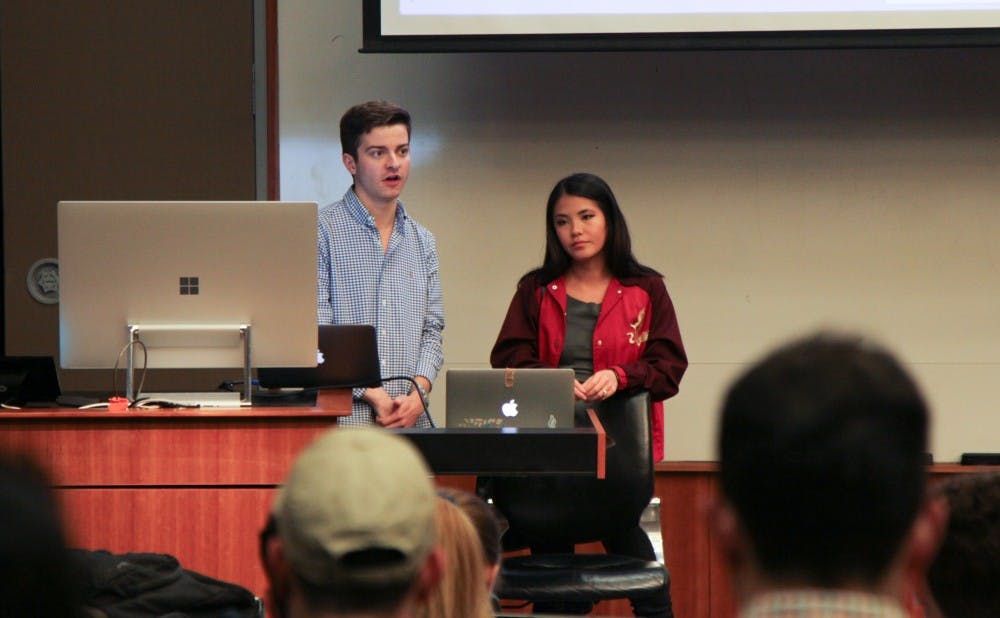At Wednesday’s Duke Student Government meeting, the Senate approved resolutions in support of the expansion of Duke's computer science department and against “medically unnecessary surgeries on intersex individuals," heard a presentation on a new mentoring program and funded an Integrity Week.
And they allocated $3,000 out of their surplus fund for a common room tent in K-Ville.
The tent, which would include two "foam filled" large bean bags—valued at $400 for the pair—and ten small bean bags—also coming in at $400 for the set—will be furnished with $300 worth of carpeting and $200 worth of assorted board games and storage resources. The budgetary statute was introduced by junior Grant Besner, ad-hoc senator for campus life, and senior Lizzie Speed, vice president for campus life.
"The whole idea [of the common room] is to get people out of their tents into a common space so they can meet people they otherwise would not know,” Besner said.
According to the text of the resolution, the tent is expected to be operational from Jan. 12 to March 3.
The budgetary statute passed by a voice vote.
The Senate also passed an amended resolution to encourage the administration and the Board of Trustees to issue an institutional policy to stop “medically unnecessary surgeries on intersex individuals within Duke medical facilities"—specifically for infants because they lack “verbal skills to give consent.”
Sophomore Ivan Robles, senator for equity and outreach, presented the resolution.
“This is our opportunity for Duke to be a pioneer for medical justice and support a marginalized group,” Robles said. “Oftentimes, parents come forward because they are under misinformation of what gender issues are.”
If genitalia seems ambiguous, doctors will default to constructing female genitalia because it is easier to form, he added. Such cosmetic surgeries are “human rights violations,” as infants lack verbal skills to provide consent. However, he said that he isn't aware of these practices taking place at Duke.
First-year Joseph Touma, member of SOFC and senator for services and sustainability, pushed back, saying that he believed that the resolution “has nothing to do with undergraduate education at Duke.”
“Smoking policy affects undergraduates. Computer science affects undergraduates," Touma. "This does not directly affect undergraduate students."
President Riyanka Ganguly, a senior, pointed to precedent of DSG supporting similar legislation such as Amendment 1 in North Carolina in 2012 and opposed House Bill 2 in 2016. She explained that action against cosmetic intersex surgeries has been “gaining momentum” with growing support from student organizations and the alumni network.
“[This legislation will] get medical professionals—who do have knowledge—to pay attention,” Ganguly said.
An amendment–motioned by first-year Tyler Long, senator for Durham and regional affairs–changed a clause to define “too young to consent” based on the Human Rights Watch’s definition.
“It’s a process of consent, and these infants are not included,” Robles said.
The amendment passed with a majority roll-call vote.
In other business:
First-year Shreyas Gupta, senator for equity and outreach, presented a resolution to support the improvement and expansion of the computer science department. The resolution noted that computer science has been growing exponentially in enrollment and graduation rates, yet the number of faculty members have not kept up with this trend. Junior Sean Bissell, vice president for academic affairs, endorsed the legislation—which passed with unanimous consent.
Junior Monika Dharia, a DSG policy advisor, presented a new mentorship program for those holding a DSG office. She explained that DSG tends to have more merit scholars and come from families of higher income. In contrast, DSG does not have a significant amount of international nor engineering students. The mentorship program would serve to ameliorate these inequalities.
Get The Chronicle straight to your inbox
Sign up for our weekly newsletter. Cancel at any time.
Also, $1,260 was allocated from the surplus fund to the academic affairs committee and the Honor Council for an Integrity Week.

Stefanie Pousoulides is The Chronicle's Investigations Editor. A senior from Akron, Ohio, Stefanie is double majoring in political science and international comparative studies and serves as a Senior Editor of The Muse Magazine, Duke's feminist magazine. She is also a former co-Editor-in-Chief of The Muse Magazine and a former reporting intern at PolitiFact in Washington, D.C.

